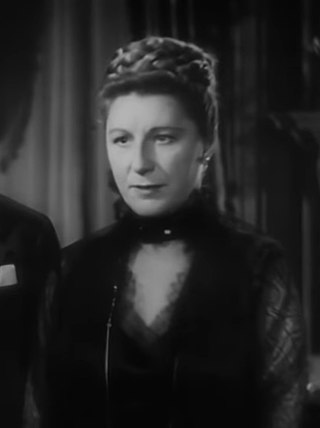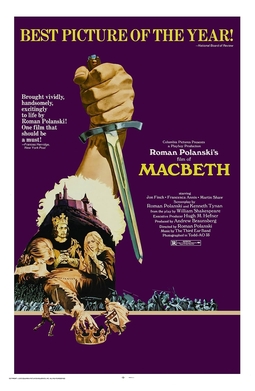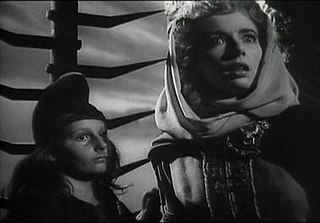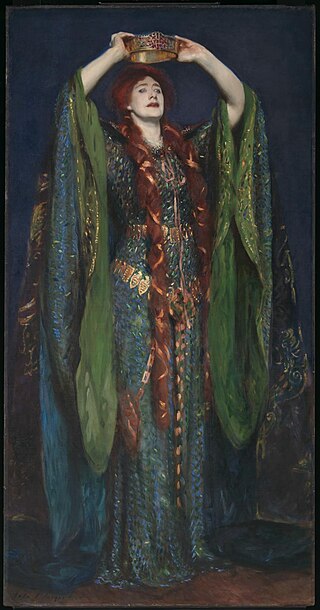Related Research Articles

Dame Frances Margaret Anderson,, known professionally as Judith Anderson, was an Australian actress who had a successful career in stage, film and television.

Macbeth is a 1971 historical drama film directed by Roman Polanski, and co-written by Polanski and Kenneth Tynan. A film adaptation of William Shakespeare's tragedy of the same name, it tells the story of the Highland lord who becomes King of Scotland through treachery and murder. Jon Finch and Francesca Annis star as the title character and his wife, noted for their relative youth as actors. Themes of historic recurrence, greater pessimism and internal ugliness in physically beautiful characters are added to Shakespeare's story of moral decline, which is presented in a more realistic style.

Maurice Herbert Evans was an English actor, noted for his interpretations of Shakespearean characters. His best-known screen roles include Dr. Zaius in the 1968 film Planet of the Apes and Maurice on Bewitched.

Hallmark Hall of Fame, originally called Hallmark Television Playhouse, is an anthology program on American television, sponsored by Hallmark Cards, a Kansas City–based greeting card company. It is the longest-running prime-time series in the history of television; it began airing in 1951 and aired on network television until 2014, with episodes largely limited to one film in a span of several months since the 1980s. Since 1954, all of its productions have been broadcast in color. It was one of the first video productions to telecast in color, a rarity in the 1950s. Many television films have been shown on the program since its debut, though the program began with live telecasts of dramas and then changed to videotaped productions before finally changing to filmed ones.

Macbeth is a 1948 American historical drama directed by Orson Welles. A film adaptation of William Shakespeare's tragedy of the same name, it tells the story of the Scottish general who becomes the King of Scotland through treachery and murder. The film stars Welles in the lead role and Jeanette Nolan as Lady Macbeth.

Macduff's son is a character in William Shakespeare's tragedy Macbeth (1606). His name and age are not established in the text; however, he is estimated to be 7–10 years of age. He is Shakespeare's typical child character—cute and clever. While Lady Macduff and her children are mentioned in Holinshed's Chronicles as the innocent victims of Macbeth's cruelty, Shakespeare is completely responsible for developing Macduff's son as a character. The boy appears in only one scene (4.2).
Macbeth is a play by William Shakespeare.

Macbeth is a 2006 Australian adaptation of the play by William Shakespeare of the same name. It was directed by Geoffrey Wright and features an ensemble cast led by Sam Worthington in the title role. Macbeth, filmed in Melbourne and Victoria, was released in Australia on 21 September 2006.
George Louis Schaefer was an American director of television and Broadway theatre, who was active from the 1950s to the 1990s.
William Shakespeare's Macbeth has been screened numerous times, featuring many of the biggest names from stage, film, and television.

Macbeth is a silent, black-and-white 1916 film adaptation of the William Shakespeare play Macbeth. It was directed by John Emerson, assisted by Erich von Stroheim, and produced by D. W. Griffith, with cinematography by Victor Fleming. The film starred Herbert Beerbohm Tree and Constance Collier, both famous from the stage and for playing Shakespearean parts. Although released during the first decade of feature filmmaking, it was already the seventh version of Macbeth to be produced, one of eight during the silent film era. Although 1916 was the middle of WW1, this film was part of numerous festivities to commemorate the 300th anniversary of Shakespeare's death. It is considered to be a lost film.

Macbeth is a 1960 television film adaptation of the William Shakespeare play presented as the November 20, 1960 episode of the American anthology series Hallmark Hall of Fame. The series' second production of the play was, like the 1954 live telecast, also directed by George Schaefer, and again starred English-born American actor Maurice Evans and Australian actress Judith Anderson. The supporting cast, however, was different, consisting entirely of British actors, and was filmed on location in Scotland; the 1954 version had used a mostly American cast.

The Real Thing at Last is a "lost" satirical silent movie based on the play Macbeth. It was written in 1916 by Peter Pan creator and playwright J. M. Barrie as a parody of the American entertainment industry. The film was made by the newly created British Actors Film Company in response to news that American filmmaker D. W. Griffith intended to honor the 300th anniversary of William Shakespeare's death by producing of a film version of the play. It was subtitled A Suggestion for the Artists of the Future. It was screened at a charity benefit attended by the royal family, but was not widely distributed, and no copies are known to survive.

The Voodoo Macbeth is a common nickname for the Federal Theatre Project's 1936 New York production of William Shakespeare's Macbeth. Orson Welles adapted and directed the production, moved the play's setting from Scotland to a fictional Caribbean island, recruited an entirely Black cast, and earned the nickname for his production from the Haitian vodou that fulfilled the role of Scottish witchcraft. A box office sensation, the production is regarded as a landmark theatrical event for several reasons: its innovative interpretation of the play, its success in promoting African-American theatre, and its role in securing the reputation of its 20-year-old director.
Macbeth is a 1979 videotaped version of Trevor Nunn's Royal Shakespeare Company production of the play by William Shakespeare. Produced by Thames Television, it features Ian McKellen as Macbeth and Judi Dench as Lady Macbeth. The TV version was directed by Philip Casson.

The tragic play Macbeth by William Shakespeare has appeared and been reinterpreted in many forms of art and culture since it was written in the early 17th century.
Elizabeth the Queen is a 1968 TV movie presented on Hallmark Hall of Fame. It is an adaptation of the 1930 play Elizabeth the Queen by Maxwell Anderson. The film was directed by George Schaefer.
Cradle Song is a 1960 American TV film for the Hallmark Hall of Fame directed by George Schaefer.
King Richard II is a 1954 American film directed by George Schaefer for the Hallmark Television Playhouse TV series. It starred actor Maurice Evans, who also adopted the teleplay from the original work by William Shakespeare.

The Tragedy of Macbeth is a 2021 American historical thriller film written, directed and produced by Joel Coen, based on the play Macbeth by William Shakespeare. It is the first film directed by one of the Coen brothers without the other's involvement. The film stars Denzel Washington, Frances McDormand, Bertie Carvel, Alex Hassell, Corey Hawkins, Harry Melling, Kathryn Hunter, and Brendan Gleeson.
References
- ↑ Foster, Bob. "TV – Radio / Two Hours of Macbeth" (San Mateo Times, August 25, 1954, page 23)
- ↑ "Macbeth on Color TV / Hallmark Will Sponsor Production November 28 / WDAF-TV Will Carry the First Classic Drama in New Medium — Roles for Maurice Evans and Judith Anderson" (The Kansas City Times, September 28, 1954, page 3)
- ↑ "'Macbeth' set in 2-Hr. Show" / Judith Anderson, Evans to Co-Star" (Charleston Daily Mail, November 28, 1954, page 41)
- ↑ Gould, Jack. "Television in Review / Adaptation of 'Macbeth' Shown on N.B.C." (The New York Times, November 29, 1954, page 32)
- ↑ Crosby, John. "Third TV 'Macbeth' Is the Best" (Pittsburgh Post-Gazette (December 4, 1954, page 19)
- ↑ John Crosby's Column. "Video Discovering Literary Classics / Millions View a Single Show" (Toledo Blade (January 19, 1955)
- ↑ Macbeth at IMDb